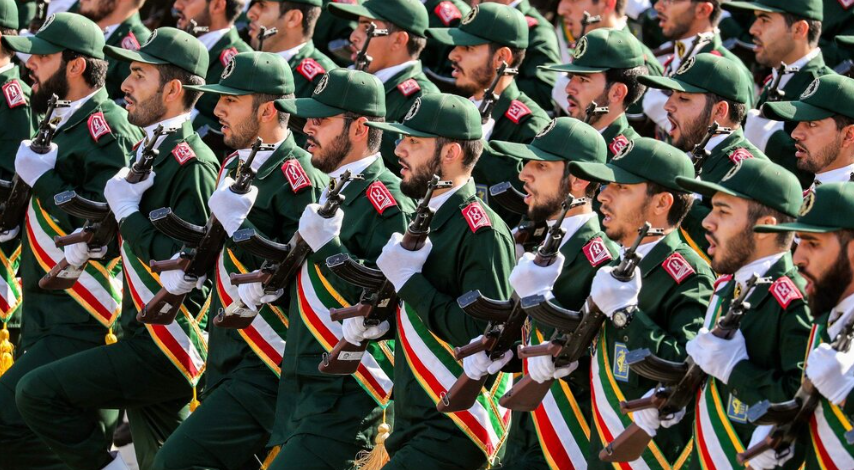February 17, 2023
by Warren L. Nelson
The EU Parliament has voted overwhelmingly by almost 99 percent! to call for the Pasdaran to be listed as a terrorist organization, an immense escalation in the European impatience with the Islamic Republic.
The vote January 19 was one of the biggest political defeats the regime has ever suffered. But it did not seem to signal to many in Iran that its policy of confronting foreign states just further isolates the country and makes it much harder to function both politically and economically.
The vote in the EU Parliament was 598-9, showing a remarkable unanimity of disgust for the Islamic Republic on a continent where most politicians previously blamed the United States rather than Tehran for the bad relations between the two.
In a little noted companion action, the UK House of Commons seven days earlier voted unanimously to recommend that the cabinet name the Pasdaran as terrorist.
Four years ago, when the Trump Administration listed the Pasdaran as a terrorist organization, there were few in Europe who supported the move. Most establishment politicians saw the move as more Trumpian foolishness destined to escalate confrontation where the world should be trying to reduce confrontation.
But all that has changed. The parliamentary votes showed that more and more people in Europe have had it with the Islamic Republic especially since they have seen the public uprising against the regime that started last September.
The vote was largely symbolic. The EU Parliament does not have a list of terrorist organizations. Such lists are maintained by many of the EU’s 27 member states and by the EU executive council. The parliamentary resolution merely urged member states and the EU executive branch to cite the Pasdaran as a terrorist group, an action that itself would be little more than symbolic. But none of those has so far voted to tab the Pasdaran as terrorist.
In one of the few thoughtful statements opposing the listing, Swedish Foreign Minister Tobias Billstrom objected that the EU legislators wanted to list the Pasdaran as a terrorist group for the way they have been mistreating protesters in Iran. Billstrom said, “The Pasdaran cannot be put on the list of terrorist organizations just for violating human rights inside Iran rather they should have ties with terrorism.” Otherwise, he said, there is a “danger that a person who is sanctioned would file a complaint with the European Court of Justice and be delisted and such a thing has happened in the past.” Therefore, he said, “I don’t think such a move would be rational.”
Basically, there is a feud between the foreign policy professionals and the politicians. The politicians have had it with Iran and want to declare their disgust publicly. The foreign policy professionals are fearful that declaring the Pasdaran to be a terrorist organization will simply make it harder to deal with Iran and might prompt the Islamic Republic to permanently kill the Joint Comprehensive Plan of Action (JCPOA), although that nuclear deal is for all practical purposes a dead letter already.
The European Commission, the executive branch of the EU, has declined to act even though the president of the commission, Ursula Von Der Leyen of Germany, has publicly endorsed the call for the Pasdaran listing. She has been successfully countered by Josep Borrell of Spain, the EU foreign policy chief. The EU has instead issued a raft of new sanctions against Iran.
Sanctions have long been the American preferred way to telegraph disgust with a regime. Most other countries have frowned on the Americans for doing that for decades. But the attitude has changed, at least so far as Iran and Russia are concerned. Sanctions on Iranians are now being proclaimed every few weeks by the EU, Canada, Britain, Australia, New Zealand, Switzerland and others.
In addition, the UN recently voted to kick Iran off the UN Commission on the Status of Women.
In Tehran, the officials huffed and puffed over the EU vote and threatened all sorts of horrible and beastly responses if the Pasdaran were ever cited as terrorist. It was essentially the same reaction as five years ago when the US listed the Pasdaran as a “Foreign Terrorist Organization,” the first state agency to be so listed. But Iran never did anything substantive.
Foreign Minister Hossein Amir-Abdollahian also proclaimed that any EU listing would violate the Charter of the United Nations. He did not cite any article of the UN Charter, however, and Iran did not cite the UN Charter when the US listed the Pasdaran as a terrorist group.
The foreign minister also said Iran “could” withdraw from the Nuclear Non-Proliferation Treaty and kick all the inspectors from the International Atomic Energy Agency (IAEA) out of the country an obvious effort to scare the EU countries into doing nothing, although either action would prompt further European actions to hobble Iran.
When the US listed the Pasdaran as a terrorist organization, Tehran asserted that it was illegal for a government body to be named as terrorist, although there is no such international rule. Later, the Islamic Republic ignored its own claim of illegality by naming the US Central Command as a terrorist organization.
The debate over the EU citing the Pasdaran as terrorist drew a lot of news coverage and a lot of commentary, both in Europe and, especially, in Iran. All that ignored the fact that listing the group as terrorist has no real practical impact although it had immense political impact in terms of proclaiming Europe’s newly-discovered disgust with the Islamic Republic.

